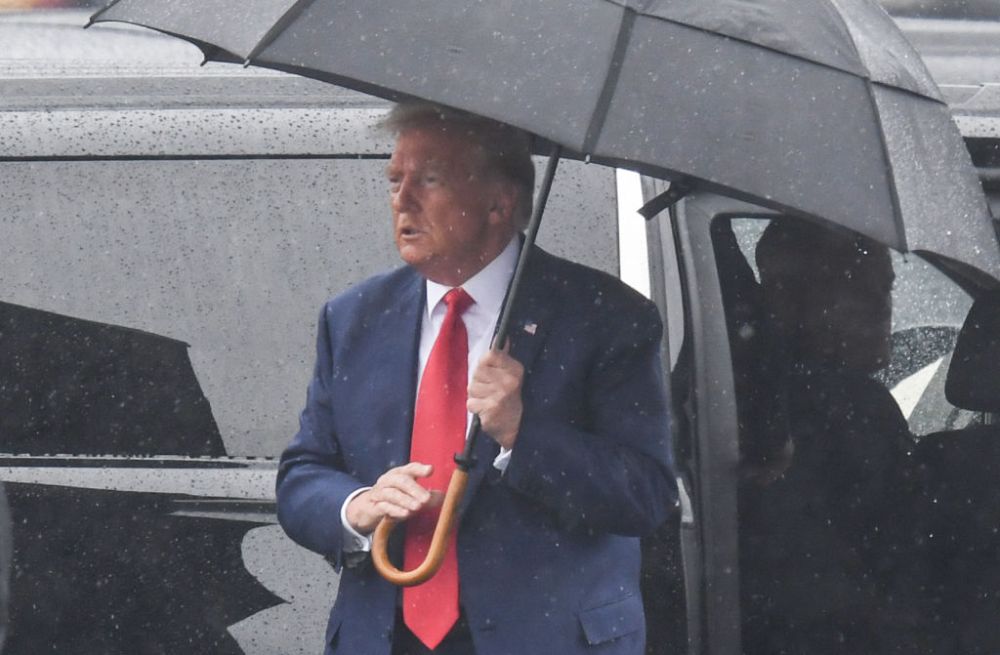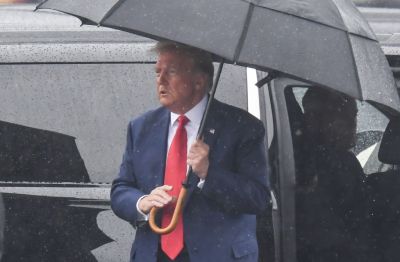Welcome back to The Collision, where we have some big news. From Sarah’s husband, Scott Keller, in an email last Friday: “We’re thrilled to announce the birth of Cavan (‘Case’) Walter Keller. Sarah is doing very well. … Case was born today on September 1, 2023. At a height of 20 inches, he weighed-in to this world at 6 pounds, 11 ounces. Sarah's maternal grandparents were from County Cavan, Ireland, and my maternal grandfather was named Walter.”
Congratulations to Sarah, Scott, and the whole family! Now, on to business.
The Docket
- Hunter Biden, the son of President Joe Biden, could be looking at a new federal indictment by the end of the month, possibly related to gun charges. The Associated Press reports that special counsel David Weiss, who also brought misdemeanor tax charges against Biden earlier this year, indicated in a new court filing that he would file an additional indictment by September 29. An earlier plea deal, which Biden’s attorneys argued included immunity from a felony gun charge, fell apart last month amid some real confusion from all parties, including the judge.
- While it will likely still be months before former President Donald Trump goes on trial, two of his co-defendants in Fulton County, Georgia, will start their own trial next month. In a hearing Wednesday, Judge Scott McAfee denied former Trump lawyers Sidney Powell and Kenneth Chesebro their requests to be tried separately. But both defendants were granted their demand for a speedy trial, which is scheduled to start on October 23.
- Former President Donald Trump has repeatedly gone after both special counsel Jack Smith and U.S. District Judge Tanya Chutkan in social media posts. Now, Smith’s team is arguing in a new complaint that Trump’s posts risk tainting the jury pool for his upcoming trial in Washington, D.C. The Tuesday filing outlines the government’s opposition to the defense’s motion to vacate an existing protective order limiting what Trump can say about information brought up during discovery. Smith wrote that Trump’s “daily extrajudicial statements” could “threaten to prejudice the jury pool.”
Polling Trump’s Indictments
Why have the other Republican candidates for president—seemingly falling further and further out of the race with each passing week—proven neither willing nor able to go after the former president for his multiple indictments? The assumption, based on both regular conversations with officials from those campaigns and from observing the obvious, is that Republican primary voters not only don’t care about Trump’s legal woes—they think he’s being unfairly targeted.
The recent Wall Street Journal poll put some more meat on those bones, finding the charges aren’t giving GOP voters any second thoughts. But the survey also spells out how these indictments could cause Trump serious trouble in a general election, because the majority of registered voters think the cases have merit—at least at this point.
Unsurprisingly, that isn’t the case among most self-described Republican primary voters. On the Stormy Daniels hush money case in New York: 61 percent say the indictment is “politically motivated and without merit”; on the Florida classified documents case: 67 percent; on the D.C. case involving overturning the 2020 election: 70 percent; and on the Georgia case on overturning the 2020 election there: 71 percent. Oh, and one more data point from GOP primary voters: 56 percent say they are aware and are following the stories of his indictments “very closely,” with another 31 percent saying they’re following it “somewhat closely.”
In other words, Republican primary voters are well aware of the legal drama unfolding—and they’re largely on Trump’s side.
The breakdown for registered voters overall, however, tells a much different story. Among that group, fewer than 40 percent believe the various cases are meritless, and solid majorities think they’re legitimate, including some who think they are politically motivated: 56 percent in both the New York and Florida cases, and 55 percent in both the D.C. and Georgia cases.
(Side note: Polling of “registered voters” tends to reflect a more Democratic sample than we see in election turnout, but for the moment, it’s a good substitute for a general electorate. And the Journal poll appears to have a registered voter sample that’s almost evenly divided among Republicans/lean Republicans and Democrats/lean Democrats.)
Bottom line: Republican primary voters appear to believe Trump when he says he’s being unfairly targeted—and are rewarding him for it—but general election voters aren’t necessarily buying it. That doesn’t mean they’ll all be motivated to vote against Trump because of these cases—according to the poll, 37 percent of registered voters say the indictments make them less likely to vote for Trump while 35 percent say it makes no difference in their decision. And again, some of those registered voters say the cases are both legitimate and politically motivated, which suggests they could still be gettable for Trump on the question.
But if the 2024 election ends up turning chiefly on the question of whether Trump is being unfairly targeted by an out-of-control justice system—a framing Trump seemingly would love to have—the general electorate isn’t yet on the former president’s side, if it ever will be.
The disparity in how the two groups view the validity of these cases also suggests why electability remains an elusive argument for Trump’s GOP rivals. Republicans view Trump as clearly electable and assume Democrats do as well—otherwise, why would they be pursuing these politically motivated indictments designed to prevent Trump from winning? But GOP primary voters live in a different universe than the rest of the electorate, the majority of which seems primed to hold the indictments and any convictions against the former president. How can Nikki Haley or Ron DeSantis effectively convince primary voters that Trump will be hampered by these legal fights when that’s a motivating reason to rally around the guy in the primary?
One More Thing
Conservative radio host Hugh Hewitt, a lawyer himself, took advantage of having Trump on his program Wednesday to ask him some questions about his legal defense. The partial transcript speaks for itself:
HUGH HEWITT: Who is your top dog lawyer? Who speaks for Donald Trump?
DONALD TRUMP: Different cases. But I would say Todd Blanche, highly respected guy, respected by everybody, is right now in there doing a very, very good job, doing a very respected job.
HH: So if you have to go to trial, will you testify in your own defense?
DT: Oh, yes, absolutely. Oh, on that …
HH: You’ll take the stand?
DT: That, I would do. That, I look forward to, because that’s just like Russia, Russia, Russia. That’s all the fake information from Russia, Russia, Russia. Remember when the dossier came out and everyone said oh, that’s so terrible, that’s so terrible, and then it turned out to be, it was a political report put out by Hillary Clinton and the DNC. They paid millions for it. They gave it to Christopher Steele. They paid millions and millions of dollars for it, and it was all fake. It was all fake.
HH: Now I think that obstruction charge is going to get to trial, Mr. President.
DT: So I look forward, I look forward to testifying. At trial, I’ll testify.







Please note that we at The Dispatch hold ourselves, our work, and our commenters to a higher standard than other places on the internet. We welcome comments that foster genuine debate or discussion—including comments critical of us or our work—but responses that include ad hominem attacks on fellow Dispatch members or are intended to stoke fear and anger may be moderated.
With your membership, you only have the ability to comment on The Morning Dispatch articles. Consider upgrading to join the conversation everywhere.